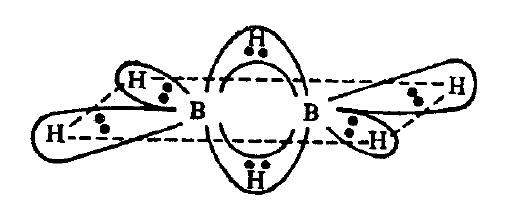Recently I saw a video which told me that Hydrogen has a valency of 1, i.e, Hydrogen can only bond with 1 other atom. But since hydrogen wants a complete shell, it can have 2 covalent bonds with 2 electrons. Please explain.
-
1$\begingroup$ Your sentences are a bit unclear. Did the video mention that hydrogen makes two covalent bonds? Well, that is the case in some three-centered bonds, but I don't think that's what they thought. $\endgroup$– M.A.R.Commented Jan 11, 2016 at 11:42
-
2$\begingroup$ Hydrogen has already one own electron in the shell. So it admits only one extra electron from some other atom. $\endgroup$– Gyro GearlooseCommented Feb 10, 2016 at 17:20
-
$\begingroup$ 1+1=2. Hydrogen has 1 electron. When it make a bond, it "gets" the second bonding electron, ergo has 2 and thus a complete shell. $\endgroup$– user37142Commented Nov 16, 2017 at 9:12
2 Answers
Apart from some Group 13 weirdness, hydrogen can only make one bond. Covalent bonds require pairs of electrons and hydrogen can only have two electrons bound in one covalent bond.
-
11$\begingroup$ Actually it's more than just group 13. Some carbocations, the trihydrogen cation etc. all have 3c-2e bonds involving hydrogen. $\endgroup$– bonCommented Jan 11, 2016 at 11:57
-
2$\begingroup$ It's even more than that. The hydrogen bonding in water may be interpreted as delocalization of the O-H vonds onto neighboring molecules. Ditto for ammonia, hydrogen fluoride, DMSO to which a strong acid has been added to make solvated protons, etc. With no inner shells to encumber it, hydrogen is making delocalized bonds in many condensed media. $\endgroup$ Commented Mar 13, 2016 at 10:31
Hydrogen forms 1 single bond when there is a s-s overlap which is the greatest overlap but it can also form 2 single bond where there are 2 s-p overlaps such as is
Even in compounds like $\ce{B2H6}$, H seems to make 2 bonds but it doesn't.

As you can see the two Hydrogen atoms in the centre make 2 bonds each with Boron.
The number of a bonds that hydrogen can make is dependent on the type of bonding.
It can form only a single ionic bond.
It can form two bonds when there is overlap involved (covalent bond)
It can form a single covalent bond.
If stability can be achieved it can form a lot of coordinate bonds, but due to it's small size and only a single proton I would think a max of 1 coordinated bond can be formed if we being with an ionised H-atom.
-
3$\begingroup$ (-1) Hydrogen does not form two "single bonds" in B2H6 $\endgroup$ Commented Feb 10, 2016 at 16:48
-
3$\begingroup$ It is a 3c2e bond and has absolutely nothing to do with the atomic orbitals that are overlapping $\endgroup$ Commented Feb 10, 2016 at 17:08
-
2$\begingroup$ @AgyeyArya Hydrogen makes two bonds (sort of) but they are not single bonds. $\endgroup$– bonCommented Feb 10, 2016 at 18:51
-
1$\begingroup$ After further reading on the matter. I would like to revoke what I said. Hydrogen make half a bond and hence not 2 bonds. $\endgroup$ Commented Feb 12, 2016 at 2:30
-
3$\begingroup$ Since ionic bonds have no direction you cannot count them. Please do not use strike through commands. If it is wrong or not important, delete it. Strike through makes it really hard to follow and understand what you are trying to convey. $\endgroup$– Martin - マーチン ♦Commented May 12, 2016 at 8:15
